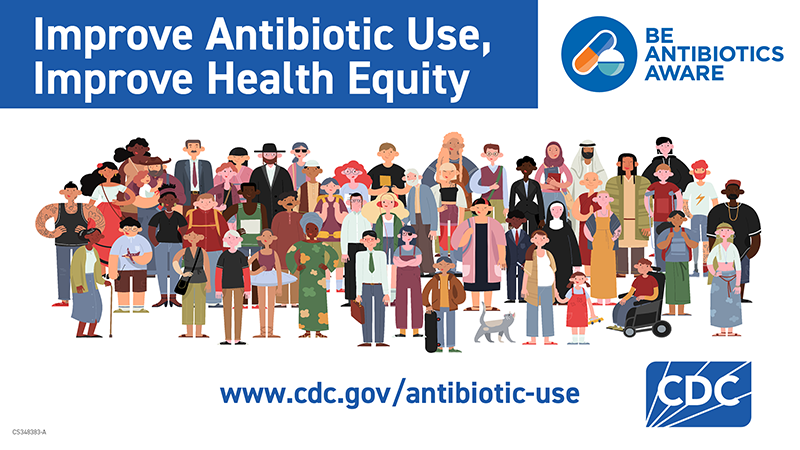Advancing Health Equity in Health Care
Posted on by
In March 1966, Dr. Martin Luther King, Jr. said, “Of all the forms of inequality, injustice in health is the most shocking and the most inhuman.” Health equity is the state in which everyone has a fair and just opportunity to attain their highest level of health. Health disparities and inequities in infectious diseases (ID) have existed throughout history, and ongoing inequities became more evident during the coronavirus disease 2019 (COVID-19) pandemic. Within the subspecialties of healthcare epidemiology, infection prevention and control, and antimicrobial stewardship, there is also evidence that certain patient populations are at increased risk for infectious complications during hospitalization, and antibiotic prescribing varies according to several factors, including patient race and ethnicity, geographic location, and type of prescriber.
To increase the publication and accessibility of ID-related Diversity, Equity, and Inclusion (DEI) content, the Infection Control and Hospital Epidemiology (ICHE) journal editors issued a call for DEI-focused manuscripts. Several scientific papers published as a part of the collection provide insights ranging from disease-related inequities based on socioeconomic status to antibiotic prescribing discordance based on race/ethnicity. Released in the April 2024 issue of ICHE, we authored Advancing Health Equity through Action in Antimicrobial Stewardship and Healthcare Epidemiology, which synthesized the valuable insights provided through the ICHE DEI collection. Additionally, we provided commentary on how individual clinicians, healthcare organizations, and the public health workforce can apply these findings to their healthcare epidemiology, infection prevention and control, and antimicrobial stewardship activities.
Everyone has a role to play in improving equity, whether you are providing clinical care or leading infection prevention and control, antimicrobial stewardship implementation, or an entire healthcare organization. The act of addressing the uncovered inequities may seem daunting. Nonetheless, we emphasize that making a personal commitment to equity is an important starting point. That commitment to mitigating disparities will hopefully create a forum to conduct an assessment of your practices, including assessing implicit biases and examining how social determinants of health may impact your patients and the community more broadly. This will aid in equitably addressing the needs of different populations.
Finally, the continued advancement of equitable interventions requires the inclusion of diverse individuals in the workforce. Thus, we all must acknowledge our role in advocating for the recruitment of marginalized individuals into infectious disease and public health roles. Moreover, we must also commit to providing these recruits with mentorship and support throughout their careers.

Authors:
Jacinda C. Abdul-Mutakabbir PharmD, MPH, is an Assistant Professor of Clinical Pharmacy and Researcher at the University of California San Diego. Her translational research program is focused on identifying inequities in antimicrobial resistance and stewardship to inform tailored interventions for vulnerable communities.
Lauri Hicks, DO, FACP is a Captain in the US Public Health Service and the Chief of the Medical Product Safety Branch in the Division of Healthcare Quality and Promotion at the U.S. Centers for Disease Control and Prevention in Atlanta.
One comment on “Advancing Health Equity in Health Care”
Comments listed below are posted by individuals not associated with CDC, unless otherwise stated. These comments do not represent the official views of CDC, and CDC does not guarantee that any information posted by individuals on this site is correct, and disclaims any liability for any loss or damage resulting from reliance on any such information. Read more about our comment policy ».
Comments are closed.


Very interesting paper, kudos!
I’d like to suggest an additional pathway by which infection prevention leaders can practice health equity: by ensuring that all healthcare team members have access to PPE that fits them and is sufficiently protective.
The question of PPE fit for diverse health professional teams has been studied (Chopra 2021), but hasn’t been solved. Indeed, it’s hard to say if the situation has even been improving. Is sufficient data collection and research on this topic occurring?
The related question of whether *all* hospital and healthcare staff have access to appropriate PPE (in particular, disposable or elastomeric respirators to prevent transmission of airborne disease) — not just staff who are more educated or higher paid — I am not aware of research or data collection on that topic.
Chopra, J., Abiakam, N., Kim, H., Metcalf, C., Worsley, P., & Cheong, Y. (2021). The influence of gender and ethnicity on facemasks and respiratory protective equipment fit: a systematic review and meta-analysis. BMJ global health, 6(11), e005537. https://doi.org/10.1136/bmjgh-2021-005537